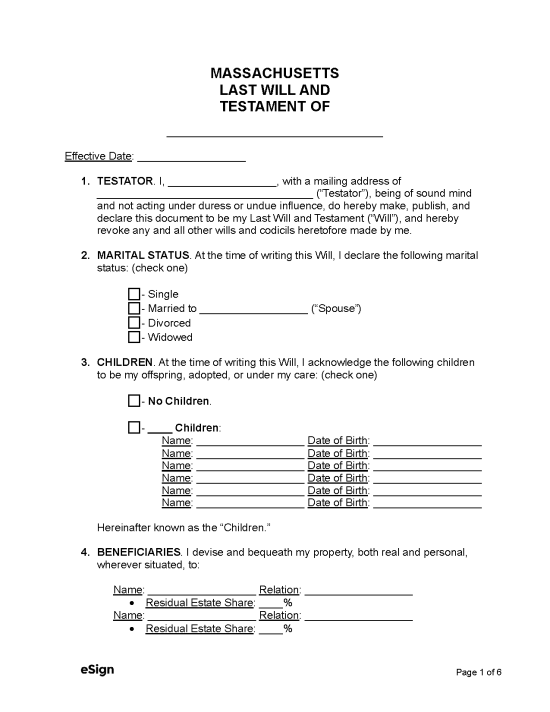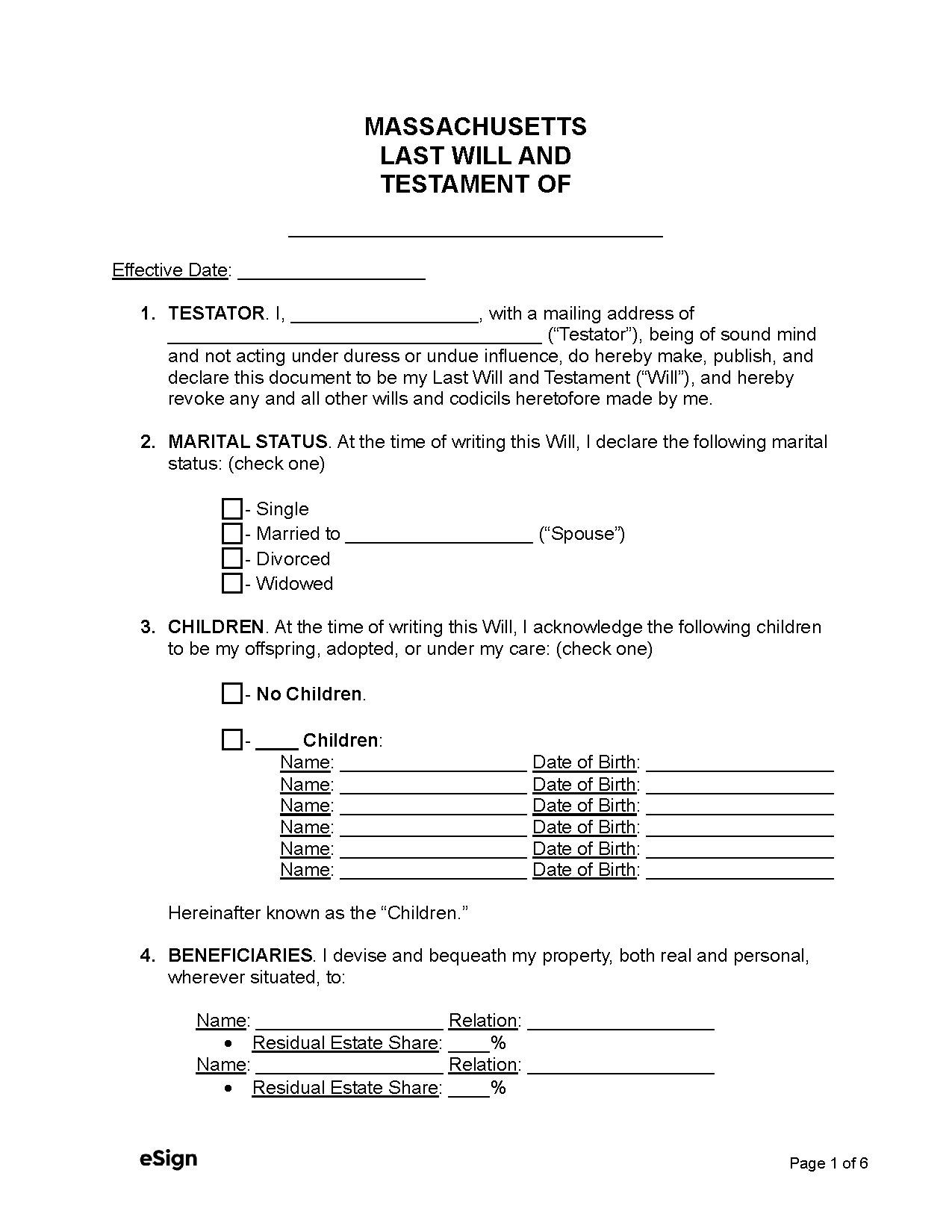State Laws
A will can only be drafted by someone 18 years or older who is of sound mind.[1]
Holographic Wills – Handwritten wills must meet the same statutory requirements as standard wills; i.e., signed by the testator and two witnesses.[2]
Revocation – A will can be revoked if the testator creates a new will or if they destroy the original will.[3]
Signing Requirements – A will must be signed by the testator (or an authorized party signing on their behalf) and two witnesses.
Probate Process in Massachusetts (7 steps)
Generally speaking, probating an estate must occur within three years of the testator’s death.[4] In Massachusetts, most proceedings are “informal” rather than “formal,” meaning the court is less involved throughout the process. The guide below covers informal proceedings only.
- Notice of Petition
- File Documents
- Provide Bond (If Applicable)
- Publish Notice
- Prepare Inventory
- Distribute Estate
- Close Estate (Optional)
The following is meant to be a general overview of the probate process. It is recommended that executors/personal representatives consult with an attorney if they’re unsure of any step.
1. Notice of Petition
2. File Documents
The personal representative may begin proceedings by filing the forms below as a complete set with the Registry of Probate from the decedent’s county.[7] They can be filed in-person, by mail, or online.
- Petition for Informal Probate of Will/Appointment of PR (MPC 150) – This form petitions the court for informal probate and Letters of Authority.
- Surviving Spouse, Children, Heirs at Law (MPC 162) – This form identifies the decedent’s spouse, children, and heirs.
- Devisees (MPC 163) – This form identifies the beneficiaries in the will.
-
Order of Informal Probate of Will and/or Appointment of PR (MPC 750) – This completed document will be signed by the court if the petition is approved.
- Notice of Informal Probate and Return of Service (MPC 550) – The completed Return of Service is used as proof that interested parties were given proper notice.
- Bond (MPC 801) – This form is used to file a bond with the court (if applicable).
-
Original Will – The original will must be submitted with the documents.
-
Certified Copy of Death Certificate – A certified copy of the death certificate must be included when filing.
- Filing Fee – A fee of $390 must be provided.[8]
If the court or the will does not require a bond, the personal representative will be issued the Letters of Authority (MPC 751), authorizing them to perform their duties. Certified copies may be obtained for $25 each.
3. Provide Bond (If Applicable)
Unless waived by the will or the court, the personal representative must post bond to provide collateral for the estate and protect the devisees from any mishandling of assets.[9] The bond amount is equal to the estimated value of the estate’s personal property as listed on the form and must be posted before the personal representative carries out any further duties. A surety for the bond can be found via:
4. Publish Notice
5. Prepare Inventory
The personal representative must prepare an Inventory (MPC 854) detailing the contents of the decedent’s estate and their fair market value within three months of their appointment.[11] Copies must be mailed to interested persons OR filed with the court.
If requested by the court or required by law, the personal representative must file the Account (MPC 853) and pay the filing fee. Otherwise, filing or completing the Account is not required.
6. Distribute Estate
7. Close Estate (Optional)
To close an estate, the personal representative may file the Closing Statement (MPC 850) or the Petition for Order of Complete Settlement (MPC 855).
Filing the Closing Statement does not require the court’s approval of an Account, and it may be contested for up to a year after filing. The Closing Statement may be filed and sent to interested parties if the following requirements are met:[13]
- The period for creditors to present claims has expired.[14]
- Six months have passed since the personal representative’s appointment.
- The Account has been served on interested parties and filed (if applicable).
- The estate’s distribution is completed (including settling claims).
Otherwise, the Petition for Order of Complete Settlement may be filed along with a final Account.[15] Once approved, the personal representative is discharged, and the Account cannot be contested. Before filing, the following must apply:
- The time limit for presenting claims has expired.
- If the personal representative is not petitioning, a year has passed since their appointment.
- All interested parties approve the Petition, OR a court citation has been delivered to interested parties 14 days before the return date set by the court and published in a county newspaper seven days before the return date.[16]
It should be noted that closing an estate after distribution is technically not mandatory; however, it is standard and highly advisable. That said, the court still has the authority to order a personal representative to close an estate.

